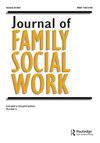Substance use disorder: a model of atmosphere within families living with SUD
IF 0.7
Q3 SOCIAL WORK
引用次数: 1
Abstract
ABSTRACT This study shares the experiences of 16 family members who have lived with a close relative with substance use disorder (SUD). Primarily, the study asks, what are the experiences of family members living with an individual with SUD? In particular, what are their experiences of affection and emotional bonds? Moreover, it asks, what are the experiences of each family member regarding cohesion and communication? Qualitative methods were used, and 16 semi-structured interviews were conducted. The participants were organized into groups of four: four parents, four spouses, four adult children and four siblings of individuals affected by SUD. Each group comprised two men and two women. Overall, the participants felt that SUD had harmed their families’ emotional bonds. Parents and adult children reported greater affection toward their relatives with SUD (children and parents) than spouses and siblings did toward their relatives affected by SUD (spouses and siblings). These feelings were expressed in terms of positive emotions such as compassion and hope, whereas spouses and siblings expressed more negative feelings such as hopelessness or rage. From the analysis, a proposed dynamic functional model of emotional states in the study’s families was formed, showing the dynamics of feelings and emotional bonds between specific family members and the family member with SUD (This paper is a part of a larger research project).物质使用障碍:SUD家庭氛围模型
摘要:本研究分享了16名与物质使用障碍(SUD)密切相关的家庭成员的经历。该研究首先提出的问题是,与患有SUD的人生活在一起的家庭成员的经历是什么?特别是,他们对感情和情感纽带的体验是什么?此外,它还问道,每个家庭成员在凝聚力和沟通方面的经历是什么?采用定性方法,进行了16次半结构化访谈。参与者被分为四组:四名父母、四名配偶、四名成年子女和四名患有SUD的个人的兄弟姐妹。每组由两男两女组成。总的来说,参与者认为SUD损害了他们家庭的情感纽带。父母和成年子女对患有SUD的亲属(子女和父母)的感情比配偶和兄弟姐妹对患有SUD的亲属(配偶和兄弟姐妹)的感情要大。这些感觉以积极的情绪表达,如同情和希望,而配偶和兄弟姐妹则表达更多的消极情绪,如绝望或愤怒。通过分析,我们提出了一个研究家庭情绪状态的动态功能模型,显示了特定家庭成员与患有SUD的家庭成员之间的情感和情感联系的动态(本文是一个更大的研究项目的一部分)。
本文章由计算机程序翻译,如有差异,请以英文原文为准。
求助全文
约1分钟内获得全文
求助全文
来源期刊

Journal of Family Social Work
SOCIAL WORK-
CiteScore
2.10
自引率
0.00%
发文量
4
期刊介绍:
Each issue of the Journal of Family Social Work contains peer reviewed research articles, conceptual and practice articles, creative works, letters to the editor, and book reviews devoted to innovative family theory and practice subjects. In celebrating social workers" tradition of working with couples and families in their life context, the Journal of Family Social Work features articles which advance the capacity of practitioners to integrate research, theory building, and practice wisdom into their services to families. It is a journal of policy, clinical practice, and research directed to the needs of social workers working with couples and families.
 求助内容:
求助内容: 应助结果提醒方式:
应助结果提醒方式:


